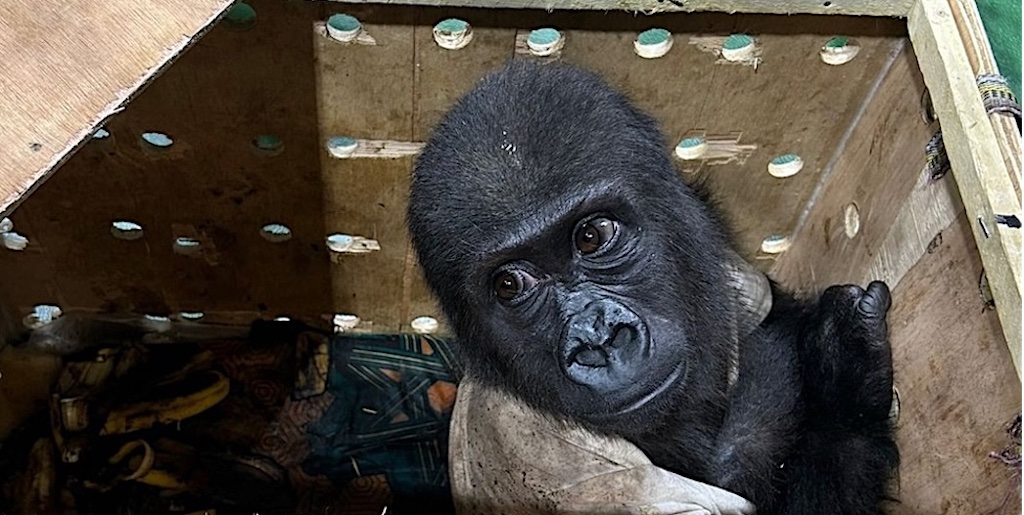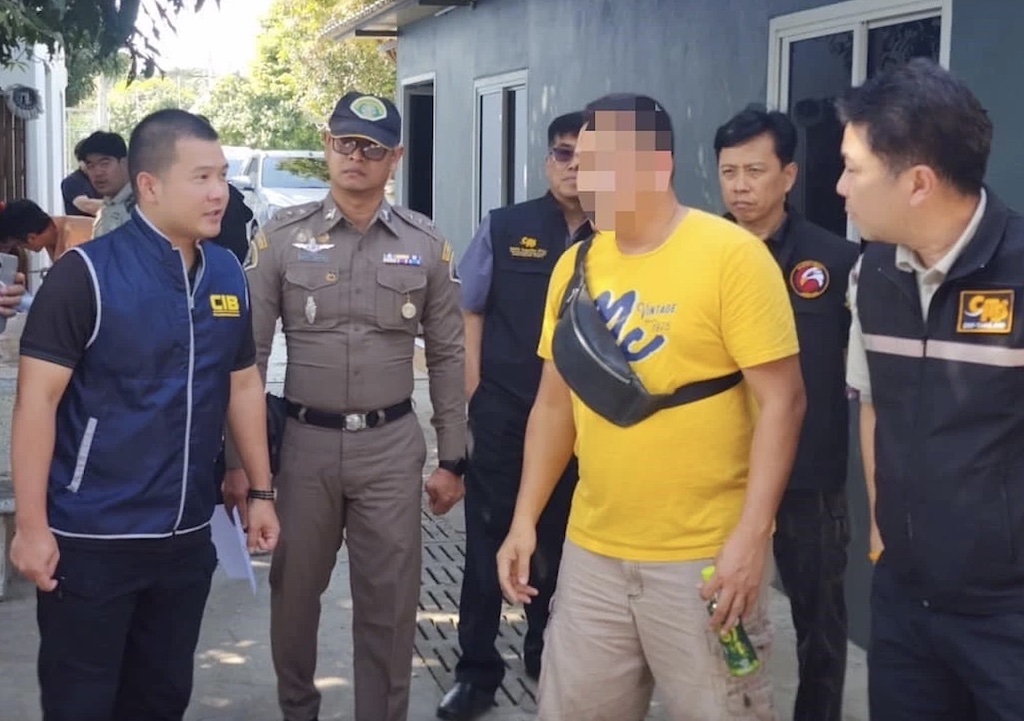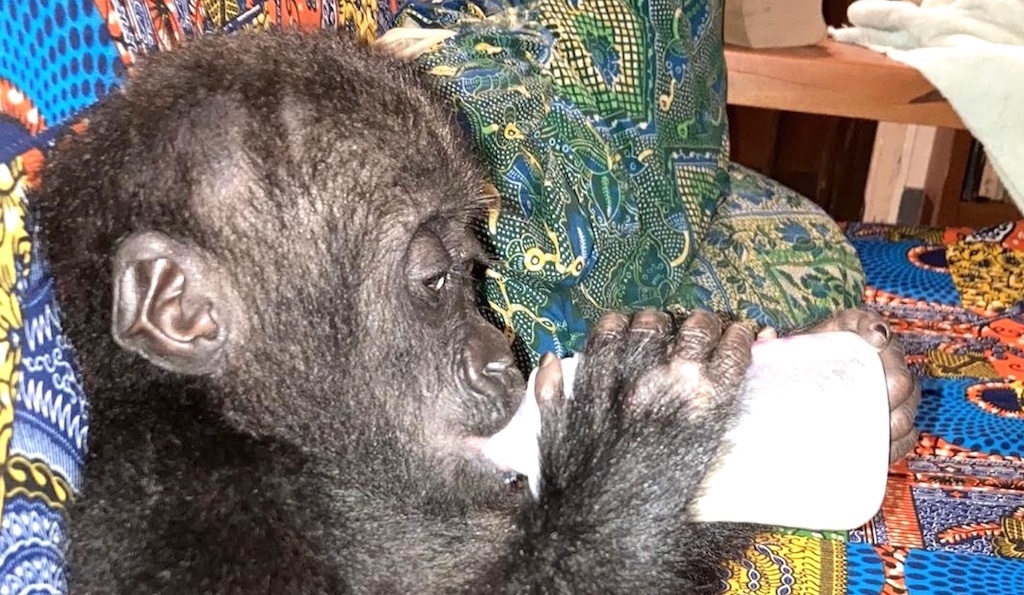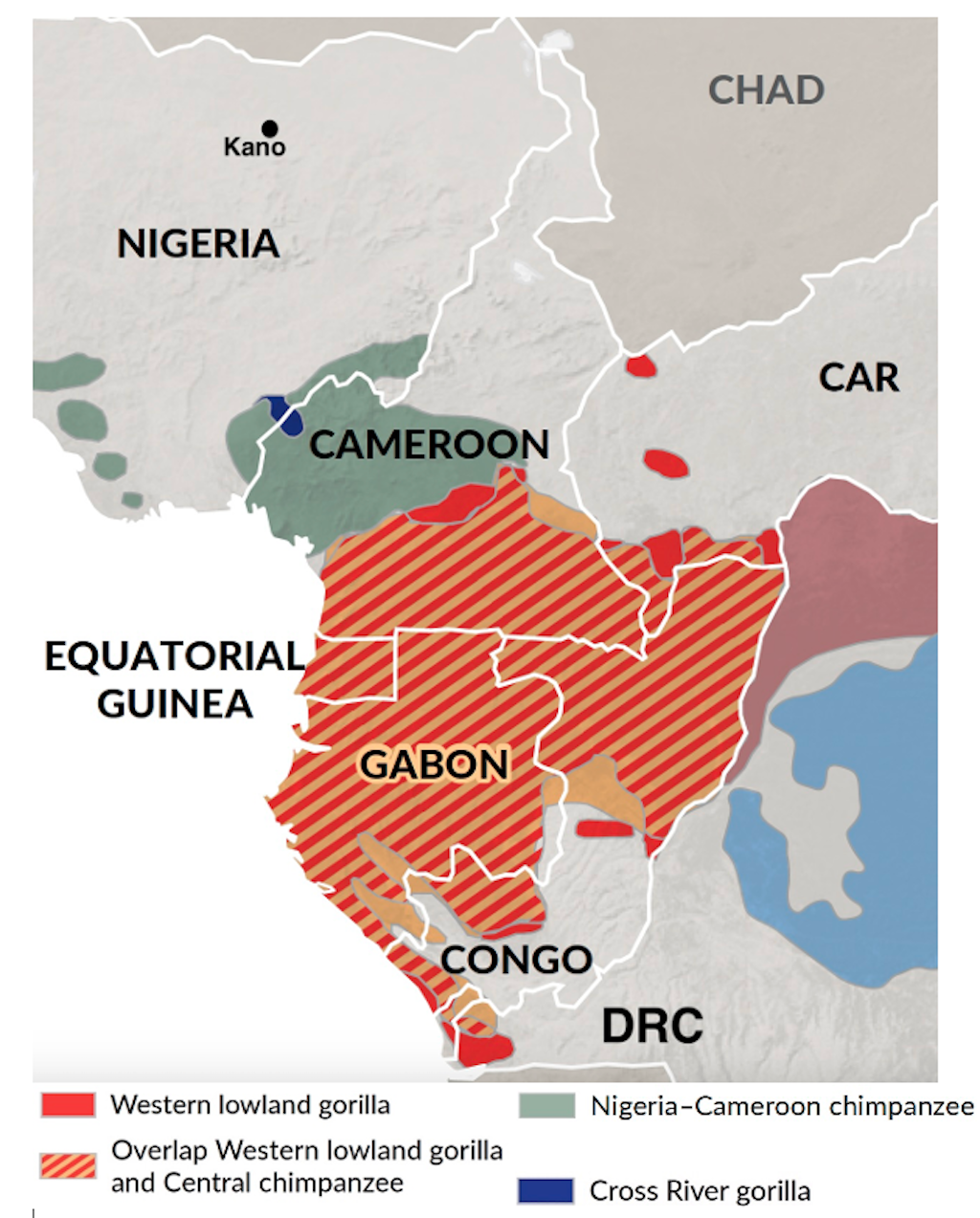
07 Feb Nigerian link in global gorilla trafficking
Daniel Stiles investigates organised transnational networks smuggling great apes from Africa via Nigeria

Five-month-old Zeytin was seized in Istanbul by customs officials. Photo courtesy the Turkish Trade Ministry via Reuters
A syndicate based in northern Nigeria has emerged as part of an organised transnational network that is receiving great apes and other endangered species from traffickers in other African countries and smuggling them overseas.
This emerged from the case of “Zeytin”, one of an increasing number of endangered great apes captured in the wild and trafficked to meet demand, mainly in the Middle East, South Asia and the Far East.
On the morning of December 22 2024, Turkish Airlines flight TK624 touched down in Istanbul from Nigeria carrying a small, wooden crate in its cargo hold. The crate was in transit to Bangkok, Thailand.
The Customs Enforcement Smuggling and Intelligence Directorate at Istanbul Airport had been tracking the crate from Abuja, Nigeria’s capital, because it appeared unusual for the “50 rabbits” declared on the airway bill to be shipped at great cost from Nigeria to Thailand.
Upon opening the crate, customs agents found an infant male Western lowland gorilla, which is listed on Appendix I of the Convention on International Trade of Endangered Species (CITES), indicating that commercial international trade is prohibited. The gorilla was seized and is now being looked after at the Polonezkoy Zoo in Istanbul. A public contest resulted in the gorilla being named Zeytin, meaning “olive” in Turkish.

Police and CITES officials in Bangkok raided TK Farm International Trading and questioned owner Siriwat Suphakitkasem. Photo: IHA
Pet shop
The importer has been identified as TK Farm International Trading in Bangkok, owned by Siriwat Suphakitkasem, a registered animal importer and breeder with a large pet shop in the Chatuchak Market, known for wildlife trafficking.
Suphakitkasem sells mainly small, fuzzy animals in his pet shop and exports them to various parts of the world. He also owns TK Farm in Nakhon Pathom, about 65km west of Bangkok.
Oxpeckers examined his Facebook friends list and found several names of animal traders, some linked to great ape trafficking. One lives in Kinshasa in the Democratic Republic of the Congo (DRC) and is part of a family that has been trading birds and primates, both legally and illegally, for many years.
Suphakitkasem told Thai authorities he was assisting an African citizen named David to import rabbits, and had no idea that a gorilla was the actual cargo. He said that “David” had paid TK Trading 150,000 Thai baht (about US$4,464) for the service.
The director of the Thai Wild Fauna and Flora Protection Division and CITES representative, Sadudee Punpugdee, said an investigation being carried out in Thailand revealed the documents that claimed the crate contained 50 rabbits.
“It is unlikely any fault will be attributed to any parties in Thailand. However, be assured that coordination has been initiated between CITES Thailand and CITES representatives in Nigeria and Turkey to dismantle the smuggling ring behind the discovery,” said Punpugdee.
The Thai police are actively searching for the person they believe is the actual buyer of Zeytin. Department of National Parks Chief Attapon Charoenchansa said on December 28 that investigators had made significant progress, including obtaining intelligence suggesting the involvement of a wealthy exotic animal collector from another Asian country.
“We continue to uncover more suspicious activities and leads, though we need solid evidence to prosecute the perpetrators,” Charoenchansa said.

A Facebook page set up by a convicted great ape trafficker in Pakistan. Social media has helped to encourage illegal trade. Image supplied
Commercial parks
Social media and a proliferation of commercial wildlife parks have combined to drive a largely illegal trade to supply exotic animals – particularly charismatic ones – to fill privately owned wildlife business facilities. Young animals that can interact relatively safely with children are in highest demand, and are also used as exotic pets in the homes of the wealthy.
Western lowland gorillas such as Zeytin only occur in the wild in Cameroon, Central African Republic (CAR), Equatorial Guinea, Gabon, Republic of Congo and the DRC. They do not live in Nigeria, so Zeytin must have been smuggled into the country.
Investigations are under way and an exporter has been identified by company name, which could be fake. Based on past information, Kano in northern Nigeria is the most likely location of the traffickers. Gorillas and chimpanzees have been smuggled out of Kano at least since the 1990s.
An international NGO is collaborating with the Nigerian Customs Service to crack down on the Nigerian gorilla traffickers and said that they had made significant progress, but did not wish to make a statement that might jeopardise the investigation into Zeytin’s case.

Bili was seized in 2023 from two traffickers transporting the primate from Kano. Photo: Peter Jenkins
Primate sanctuary
On August 30 2023 another baby Western lowland gorilla was seized near Lagos from two traffickers who had transported the primate from Kano. They were arrested and the gorilla, named Bili, is now at the Drill Ranch primate sanctuary in eastern Nigeria.
Oxpeckers spoke to Liza Gadsby and Peter Jenkins, founders of the Pandrillus Foundation, which operates the Drill Ranch sanctuary. “Bili is doing fine and has gained several pounds since coming to us. She has two young chimpanzees for company and she keeps them in line,” said Gadsby.
The sanctuary has obtained a CITES import permit for Zeytin and has asked the Turkish government to repatriate him to Nigeria. “Our plan is to transfer both Bili and Zeytin together to a gorilla sanctuary in Central Africa after quarantine is completed,” said Gadsby. “There are sanctuaries there that prepare young gorillas for release back into the wild. That is our hope.”

Map showing the distribution of Western lowland gorillas and the location of Kano. Source: IUCN Red List
Easy route
Jenkins said it was easy to traffic wildlife across Nigeria. He drove with Bili all the way from Lagos to Drill Ranch in Calabar, a 14-hour journey, passing through scores of checkpoints by police, army and other government services. “Bili was sitting in my lap, many police and army officers saw her, not one asked what I was doing with her,” he said.
Bili was smuggled into Nigeria from Kinshasa, according to confidential sources. They identified the buyer as a trafficker in Jordan who was advertising the baby gorilla for sale in videos sent to potential buyers via WhatsApp.
The trafficker would have acted as the middleman in the deal, paying the Kano traffickers, helping arrange shipping to the actual buyer and pocketing the buyer’s money at a substantial mark-up in price.
Jenkins said as long as there is money to be made from trafficking wildlife for commercial zoos and pets, poor rural people will capture them and sell the animals to the highest bidder.
The trade is linked to the much larger problem of habitat destruction, he added. “With forests and savannas being converted into farmland, livestock pasture, mines and infrastructure, species such as gorillas are losing their homes.
“Simply stopping trafficking alone will not secure their future. If governments commit to protecting wildlife habitat and protecting the biodiversity in it, there could be a future. It comes down to political will,” he said.
Daniel Stiles has been engaged in investigating global wildlife trafficking over the past 25 years, following careers in academia and at the United Nations
